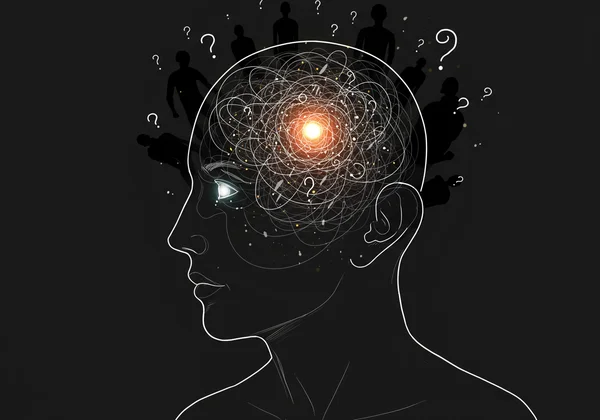How to Deal with Dark Triad Personalities Effectively: Insights from Your Dark Triad Test
August 26, 2025 | By Julian Vance
Feeling drained, confused, or manipulated by someone in your life? Navigating interactions with a challenging personality can be overwhelming. This guide offers effective strategies on how to deal with dark triad traits, helping you understand their behaviors, protect your peace of mind, and regain control. How do dark triad people act? Understanding the playbook is the first step toward empowerment. The key to managing these difficult dynamics often begins with self-awareness and knowledge, which you can start exploring with a dark triad personality test.

Understanding Dark Triad Traits in Others
Before you can effectively manage a challenging relationship, you must first understand what you are dealing with. The "Dark Triad" is a term in psychology that refers to a trio of negative personality traits: Narcissism, Machiavellianism, and Psychopathy. While they are distinct, they often overlap, creating complex and difficult behavioral patterns. Recognizing these traits is not about labeling people but about identifying behaviors that may be harmful to you.
Recognizing Machiavellianism, Narcissism, and Psychopathy
Let's break down these three core traits to make them easier to spot. Individuals high in these traits view the world through a very different lens, and understanding their perspective is crucial.
- Machiavellianism: This trait is characterized by a cynical worldview, a willingness to manipulate others for personal gain, and a focus on self-interest above all else. A person exhibiting Machiavellian traits is often a master strategist, skilled at deception and flattery to achieve their goals. They see people as pawns in their personal game of chess.
- Narcissism: Defined by an inflated sense of self-importance, a deep need for excessive attention and admiration, and a lack of empathy for others. While they may appear charming and confident, this often masks a fragile ego. Their relationships are typically superficial, designed to bolster their own self-image.
- Psychopathy: This is the darkest of the triad, marked by a profound lack of empathy or remorse, high impulsivity, and antisocial behavior. Individuals with psychopathic traits often engage in thrill-seeking and may have a history of behavioral problems. They struggle to form genuine emotional attachments and can be callously indifferent to the feelings of others.
Common Behavioral Patterns of Dark Triad Individuals
While every person is different, there are common behavioral signatures associated with these traits. You might notice a pattern of gaslighting, where someone twists reality to make you doubt your own perceptions. They might constantly lie or make promises they have no intention of keeping. These individuals often create chaos and drama, thrive in conflict, and may isolate you from friends and family to maintain control. Understanding these patterns is the first step to breaking free from their influence. To better understand these traits, a structured assessment can provide clarity.

Setting Clear Boundaries with Dark Triad Individuals
One of the most powerful tools in your arsenal is the ability to set and enforce strong boundaries. Individuals with Dark Triad traits are masters at pushing limits and exploiting ambiguity. Setting boundaries is not about controlling them; it's about protecting your own energy, time, and mental well-being. It is your non-negotiable declaration of how you expect to be treated.
Establishing Non-Negotiable Limits
Your boundaries are your personal rules of engagement. They must be clear, firm, and based on your values. Start by identifying your non-negotiables. This could be a refusal to tolerate disrespectful language, a limit on after-hours work calls, or a decision not to lend money. Write these limits down for yourself. The act of defining them makes them real and reinforces your commitment to upholding them. These are not suggestions; they are your personal policies for self-preservation.
Communicating Boundaries Assertively and Consistently
Communicating a boundary is often the hardest part. Use clear, simple, and firm language. Avoid over-explaining or justifying your feelings, as this can provide an opening for manipulation. A simple "I will not continue this conversation if you are yelling" is more effective than a lengthy plea. The key is consistency. When a boundary is tested—and it will be—you must enforce the consequence every single time. This consistency teaches the other person that you are serious and that your limits are not flexible.

Mastering Communication & Managing Difficult People
Interacting with individuals who exhibit Dark Triad traits requires a different approach to communication. Traditional methods that rely on empathy and mutual understanding are often ineffective. Managing difficult people in this context means adopting strategic communication tactics designed to protect yourself from manipulation and emotional harm. It’s about being smart, calm, and detached.
The Grey Rock Method: Reducing Engagement
One of the most effective techniques is the Grey Rock Method. The goal is to make yourself as uninteresting and unresponsive as a grey rock. Individuals with narcissistic and psychopathic traits feed on drama and emotional reactions. By refusing to provide that "fuel," you become a boring target. This means keeping your answers short and factual, avoiding revealing personal information, and maintaining a neutral tone and body language. You are not being rude; you are strategically disengaging to protect your peace.
Avoiding Common Traps: Gaslighting and Manipulation
Be prepared for common manipulative tactics. Gaslighting is a form of psychological abuse where the person makes you question your own sanity or reality. They might deny saying something you clearly remember or twist your words against you. The best defense is to trust your own perceptions and, if necessary, keep a private record of conversations and events. By staying grounded in your reality, you can resist their attempts to distort it. Recognizing these manipulation tactics is a critical skill for anyone coping with a narcissist or similar personalities.
Prioritizing Your Self-Protection & Well-being
Dealing with a person high in Dark Triad traits is emotionally and mentally exhausting. The constant need for vigilance and boundary enforcement can take a significant toll. This is why prioritizing your own well-being is not a luxury—it is an absolute necessity. Your self-care is the foundation of your resilience.
Building a Strong Support System
Isolation is a manipulative person's best friend. They often try to sever your connections with others to increase their control. Actively resist this by nurturing a strong support system. Confide in trusted friends, family, or colleagues who can offer an outside perspective and validate your experiences. This could involve scheduling regular check-ins with a close friend, joining a support group, or reconnecting with family you may have drifted from. These external perspectives are crucial because they act as an anchor to reality, countering the distorted narrative a manipulative individual may create. Sharing your story with people who have your best interests at heart can remind you that you are not alone and that your feelings are valid. This network is your lifeline.

Knowing When to Seek Professional Help
Sometimes, the situation may be too overwhelming or damaging to handle on your own. There is immense strength in knowing when to seek professional help. A therapist or counselor can provide you with specialized coping strategies, help you process the emotional impact, and guide you in making safe decisions for your future. If the behavior occurs in a workplace, involving HR may be a necessary step. Prioritizing your safety and mental health is always the right choice. If you're just starting to make sense of things, you can start the assessment to gain initial insights.
Empowering Yourself Against Challenging Personalities
Navigating relationships with individuals exhibiting Dark Triad traits is a profound challenge, but it is not an impossible one. By understanding their behaviors, setting firm boundaries, communicating strategically, and prioritizing your well-being, you can shift the power dynamic. Knowledge is your shield. The more you understand these personality structures, the less susceptible you become to manipulation and emotional harm.
This journey is about empowerment and self-discovery. Are you ready to take the first step in understanding these complex dynamics more deeply? Take our free test to gain valuable insights into your own personality profile and learn more about the traits that shape human interaction.
Frequently Asked Questions About Dark Triad Interactions
How do I know if I am dark triad?
Self-reflection is a good starting point, but a structured assessment provides a more objective measure. The most reliable way to understand your own profile is to take a scientifically validated test designed to measure these traits. An online dark triad test can give you a confidential report on your levels of Machiavellianism, narcissism, and psychopathy, which can be a valuable tool for personal growth.
How do dark triad people act?
Individuals with high levels of Dark Triad traits often act in charming but manipulative ways. They may use flattery to get what they want, show a lack of empathy for others' feelings, and feel a sense of entitlement or superiority. They can be impulsive, deceptive, and often create conflict or drama in their relationships, both personal and professional.
Can dark triad be cured?
Personality traits are generally stable and deeply ingrained, so "curing" them is not the right framework. However, individuals can learn to manage their behaviors and develop more pro-social ways of interacting. Therapy, such as Cognitive Behavioral Therapy (CBT), can help individuals recognize their harmful patterns and develop self-awareness and better coping mechanisms, but this requires a genuine desire to change.
Disclaimer: This article is for informational and educational purposes only. It is not a substitute for professional medical advice, diagnosis, or treatment. The test offered on this website is an educational tool, not a clinical diagnosis.